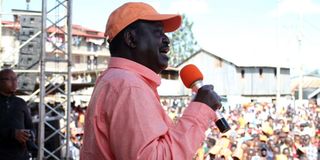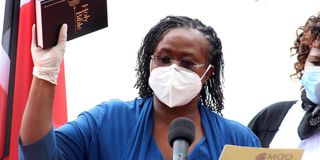Premium
As ODM's influence weakens, Raila bets on new plan to revamp party

ODM party leader Raila Odinga addresses Imran supporters at Lainisaba grounds in Kibra during a campaign rally on October 27, 2019.
What you need to know:
- Initially formed by Raila Odinga and Kalonzo Musyoka's Liberal Democratic Party (LDP) and Kanu under Uhuru Kenyatta and William Ruto, ODM's main goal was simple: to form a unified political vehicle to vote "No" against the referendum on the proposed Constitution.
- ODM went on to prove itself as a powerful force in Kenyan politics by carrying the day in the referendum.
- However, the party has come a long way since then, with its influence slowly diminishing over the past decade.
When the Orange Democratic Movement (ODM) was established in 2005 during the Kenyan constitutional referendum campaign, it entered the political stage when political temperatures were at fever pitch.
Initially formed by Raila Odinga and Kalonzo Musyoka's Liberal Democratic Party (LDP) and Kanu under Uhuru Kenyatta and William Ruto, its main goal was simple: to form a unified political vehicle to vote "No" against the referendum on the proposed Constitution.
The party's name is said to have been proposed by current Tourism Cabinet Secretary Najib Balala during a “No” rally in Kisumu, and has stuck ever since.
ODM went on to prove itself as a powerful force in Kenyan politics by carrying the day in the referendum, trouncing supporters of the proposed Constitution led by former President Mwai Kibaki.
However, ODM has come a long way since then. Once arguably Kenya's most popular political party, its influence has waned over the last decade.
The Odinga-led outfit has witnessed mass defections that party insiders say has impacted negatively on its quest for power.
Bungled primaries
Its achilles heel remains the party’s handling of primaries, which on many occasions are seen as mini-elections in ODM strongholds.
A past internal report found that bungled grassroot primaries, which many who vied in the past say are not free and fair, have led to mass walkouts and cost the party crucial seats, consequently weakening its power in Parliament over the years.
Also problematic were the infamous 'men in black' who wreck havoc during intra-party polls and meetings, contributing negatively to the party’s image.
Mr Odinga confesses that the party has had its ups and downs, but contends that this is normal even among parties in developed countries.
“We have had the challenges of the men in black but those are normal challenges in any party,” Mr Odinga said at Chungwa House, the ODM headquarters in Nairobi.

A group of the infamous 'men in black' that was sent away by irate members of the public after allegedly roughing someone up during a CORD rally at Uhuru Park, Nairobi on May 31, 2014. Some of them were captured on camera vandalising election materials during an ODM election at Kasarani.
Raila's plan
Despite the tough challenges facing ODM ahead of the 2022 General Elections, Mr Odinga is a man with a plan.
He is keen on revamping the 15 year-old party by making changes to the party’s critical organs, particularly the National Elections Board (NEB), spelling hope for ODM party members, some of who were victims of bungled nominations.
They reckon that this, coupled with other looming changes, will boost Mr Odinga’s ambition to ascend to power as bungled primaries have always punctured his hopes by triggering voter apathy.
Former National Assembly deputy Minority leader and ex-Gem MP Jakoyo Midiwo, who is also Mr Odinga’s cousin, says he was a victim of the disbanded Judith Pareno-led board, but says the changes that saw her pave way for Ms Catherine Mmuma are a step towards the right direction.
“The changes are very good but more must come along. You cannot remove Pareno and leave out Oduor Ong’wen – the party’s Executive Director. Those are birds of the same feather and for ODM to give its members confidence, it must do many more things including cleaning the Ong’wen-led secretariat,” Mr Midiwo told the Nation.
“That must be changed because it is as rotten as the National Elections Board. The secretariat has dubiously conducted nominations and must not survive.”
ODM National Treasurer Timothy Bosire also agrees that the changes are a step the right direction.
“We want to gather all and scatter none as we put our best foot forwards towards capturing power in 2022,” he said.
Nyando MP and ODM secretary of public policy and economic affairs Jared Okello, who was part of the Prof Mmuma taskforce that put together the recommendations on what ails ODM that are now being acted upon, said the changes are aimed at restoring confidence of the party's supporters.
“ODM party has received a lot of negative publicity particularly regarding its nominations. We have been branded a party of men in black during party primaries, AGM and the biggest problem has been that there has been inadequate preparation by elections board to carry out credible nominations,” said Mr Okello.
Defectors triumphed over ODM candidates
He noted that disgruntlement over poorly conducted primaries has led to the party’s diminishing support across the country with some members defecting and going on to triumph against their candidates.
“We moved from over 100 MPs to a partly 78 in the last election. That's a harsh indictment on the part of the elections board and we hope the new team shall strive to ensure the party restores its lost glory,” said Mr Okello.
Some of the ODM members who have defected to other parties or ran as independents and won include Nyali MP Mohammed Ali (Independent), Shakeel Shabbir (Kisumu East), Peter Masara (Suna West) and Olago Aluoch (Ford Kenya) among others.

Nyali MP Mohammed Ali, who left ODM to run as an independent candidate.
At the time, Mr Ali remarked that he left the party because he felt that the party nominations were a selection rather than an election.
Some including former Funyula MP Paul Otuoma, ex-Kisumu Governor Jack Ranguma defected to independent outfits after failing to clinch the ODM gubernatorial ticket for Busia and Kisumu respectively in 2017, leading to voter aparthy in their regions.
“The changes are meant to infuse confidence in the people as we gear towards 2022. It is a lesson to ODM supporters and their leaders and opponents that it is not business as usual,” Mr Okello said.
Uriri MP Mark Nyamita said the new NEB consists of people of good reputation, but also sees structural weaknesses undermining heir efforts.
“Sometimes it is not about officials but about the institutions. The previous NEB office did the best they could do under the circumstances...The true fact is that our political parties have no capacity now and in the near future to conduct credible nominations since our primaries are viewed as mini elections and are very rigorous,” said Mr Nyamita.
The primaries, he said, are done countrywide, for all the seats and more than one candidate hence the board has no capacity to conduct a credible exercise.
“So there will always be hue and cry. Maybe what political parties need to consider is to either work with IEBC...provide adequate funding to IEBC and have them conduct credible elections.”
“Alternatively, parties need to strengthen themselves in such a way that over a five year period they can pick whoever is going to be their candidate.”
But Kisumu East MP Mr Shabbir, who was a victim of the 2017 bungled primaries, quipped that the changes were a case of “same forest, different people.”
“It’s unfortunate that the ODM NEB could not even honour the decisions of the dispute resolution board…and the system has not changed yet just hungrier, corrupt ridden.”
Gem MP Elisha Odhiambo welcomed the changes saying he has conviction that it heralds a rebirth and re-invigoration of the party.
“The freshness in the membership signifies renewed hope and a pointer to a better future for the party,” he said.
New placeholders
In the new changes Ms Catherine Mumma was named chairperson of the NEB replacing nominated senator Judy Pareno who had served for a record 12 years with Abdulahi Diriye, Richard Tairo, Syntei Nchoe and Emily Awita as members.

Catherine Mumma taking the oath of office as the election board Chairperson of Orange Democratic Movement Party (ODM) on August 13, 2020 at the party’s headquarters.
Ms Pareno and her team consisting of Bob Arunga, Motindi Dominic, Norah Anindo and Edward Dzila was ousted.
Prof Ben Sihanya was appointed chairman of the party’s disciplinary committee to replace Lawyer Fred Athuok.
Other members of the committee include Ramadhani M. Abubakar, Mumbi Ngaru, Seth Kakusye and Dr Florence Omosa.
Following the new changes, Mr Athuok and his team consisting of Likoni MP Mishi Mboko, Halima Daro, and Harold Kipchumba now cease to hold the office.
The changes, according to ODM Secretary General Edwin Sifuna, are just some of many strategies the party will deploy as it readies for another political duel in 2022.
He said the elaborate plan to field a candidate will come to light after implementation of the Building Bridges Initiative (BBI) report which is expected to be made public soon.





